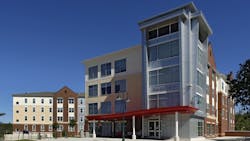University Housing Project in Pennsylvania Wins Sustainability Award
A university housing project that replaced several on-campus buildings at Shippensburg University of Pennsylvania recently won a sustainability award.
The project was recognized in the “Sustainability in Higher Education” category for a ForeverGreen Award from the U.S. Green Building Council of Central Pennsylvania.
The multi-phased, multi-million dollar project used local materials in the first phase, with more than 20 percent of the construction materials locally sourced.
Of the buildings demolished in this phase, 98 percent of the debris was either recycled or crushed into a material that was used in Phase II for various uses like construction road base, laydown areas and backfill for site operations, said project manager Bill Sutton with Fortune-Johnson. Phase II is expected to be finished by August.
The newly constructed buildings also include a variable refrigerant flow (VRF) HVAC system, which is the largest system in North America, according to the award narrative. VRF systems can reduce energy usage by nearly 25 percent.
Low-flow fixtures were also used where possible to reduce water usage by 40 percent annually. Large windows in each unit also increase natural lighting, and water bottle filling stations are located in the buildings.
“On average the three buildings from Phase I were constructed and operated in such a fashion that they saved 44 percent in energy consumption versus a typical ‘per code’ building,” Sutton said.
Shippensburg University Student Services Inc., an independent nonprofit organization that represents the student community, selected Campus Apartments LLC to lead the project. The design team included the contractor, Fortune-Johnson; architect, CUBE 3 Studio; and consulting engineer, Greenman-Pedersen Inc. This project will also become the first on campus to score a LEED certification.
